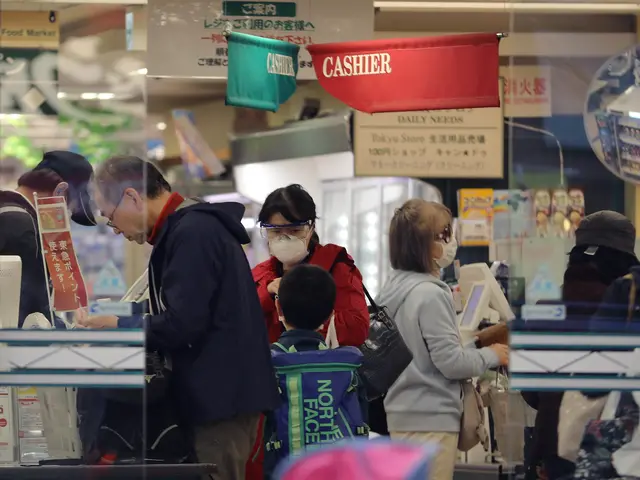Coronavirus cases in Japan increased by 570 new daily infections, health ministry and local authorities said as of Thursday evening, bringing the national total to 9,292.
As the number and pace of cases continue to increase, Japanese Prime Minster Shinzo Abe declared a nationwide state of emergency over the coronavirus crisis, to cover all Japan's 47 prefectures, a vast expansion from the seven prefectures covered by the first emergency declaration made on April 7.
The death toll from the pneumonia-causing virus now stands at a total of 203, including those from a cruise ship that was quarantined in Yokohama near Tokyo, the latest figures showed.
In Tokyo, the epicenter of Japan's outbreak, a total of 2,595 infections have been confirmed, accounting for well over one-third of all COVID-19 cases across the nation, followed by Osaka Prefecture where cases have topped the 1,000-mark at 1020 cases infections.
Kanagawa Prefecture, meanwhile, has recorded 675 infections, Chiba Prefecture 595 cases, Saitama Prefecture 564 infections, Fukuoka Prefecture 462 cases, while Hyogo Prefecture has recorded 443 cases of COVID-19, according to the latest figures Thursday evening.
The health ministry here also said the number of patients considered severely ill and are on ventilators to receive respiratory assistance or have been admitted to intensive care units for medical treatment has risen to 197.
The ministry also said that in total, 1,563 people have been discharged from hospitals after their symptoms improved, according to the latest figures.
Abe said that he decided to put all prefectures under the state of emergency to curb infections in respective areas and especially to keep the movement of people to a minimum heading into the Golden Week holidays.
He said that to end the emergency situation by May 6, it would be imperative for people to reduce contact with others by at least 70 percent and up to 80 percent.
Japan's economic revitalization minister Yasutoshi Nishimura, meanwhile, told an advisory panel that green-lit the expansion of the state of emergency being declared for all prefectures, that the issue was "urgent."
All local governments will now have the power to demand that supplies deemed essential to combating the spread of the virus be sold to them or requisitioned, and be able to temporarily commandeer private land or facilities for the purposes of providing medical care.
Local authorities will now also be able to stamp down on hoarding and insist firms help transport emergency goods if deemed necessary.
Under the declaration, and in a bid to not only curb the spread of the virus, but also try and ease the ever-increasing burden on the healthcare system, local governors will be authorized to request people to work at home and refrain from going outside as much as possible.
Abe, under the first emergency declaration, which covered just seven of Japan's 47 prefectures, called for companies to slash the number of workers in offices by a minimum of 70 percent, saying that firms should accommodate employees working from home, institute more flexible working hours and other measures to reduce the numbers of people working in offices at the same time.
Citizens, however, have been allowed to go out to buy food and medicine, as well as visit hospitals under the declaration.
Transportation systems have been kept operating and while some businesses may be asked to close, essential ones like pharmacies and supermarkets have been operating as usual.
All prefectural authorities under the declaration will be allowed to call for schools closures, and the temporary closure of other public facilities where people usually gather in large groups, such as sports stadiums or theaters.
Numerous prefectures may now see restrictions on people's movements and business activities issued, as has been the case in Tokyo.
Under the Tokyo metropolitan government's emergency plan, some businesses were required to halt their operations completely, while others were requested to suspend their activities as dictated by individual circumstances.
Some, meanwhile, have been allowed to remain open provided measures to curb the spread of the virus were taken.
Places where people typically gather in large groups were be required to halt their activities. These included businesses such as live music venues, night clubs, Internet cafes, pachinko parlors, sports clubs, game centers and cinemas.
Essential services, like medical institutions, supermarkets, convenience stores, hotels, public transport providers and financial services, among others, have remained open and have taken measures to curb the spread of the virus.
The Japanese law does not allow for the kind of wholesale lockdowns that have previously been seen in other countries, like Italy and France, and under the Japanese law penalties cannot be issued to citizens or businesses who opt not to follow requests from prefectural governors.
Abe has said that Japan would not implement the kind of a lockdown as has been seen overseas.
 简体中文
简体中文

